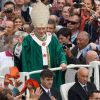VATICAN CITY - To evangelize means to help people understand that God Himself has responded to their questions, and that His response — the gift of salvation in Jesus Christ — is available to them as well, Pope Benedict XVI said.
"Our role in the new evangelization is to co-operate with God," the Pope told the more than 260 cardinals, bishops and priests who are members of the world Synod of Bishops on the new evangelization. "We can only let people know what God has done."
In a 21-minute, off-the-cuff reflection during morning prayer at the synod's opening session Oct. 8, Pope Benedict spoke of the importance of prayer in the Church's push for a new evangelization, the meaning of evangelization, and sharing the Gospel through both proclamation and charity.
The Pope examined the use of the word "evangelion," the Greek term that is the root of the English word "evangelization," and which is itself translated as "Gospel."
In the Book of Isaiah, he noted, the Hebrew equivalent of the word describes "the voice that announces a victory, that announces goodness, joy and happiness," transmitting the message that "God has not forgotten His people," and that He intervenes with power in history to save them.
In the New Testament, the Pope said, "evangelion" is the good news of the incarnation of Christ, the coming of God's Son into the world to save humanity.
For the people of Israel suffering under Roman rule, it was truly good news that God spoke to His people and came to live among them, the Pope said. News of Jesus' birth was the answer to those who questioned whether there really was a God; whether He knew His people and the circumstances of their lives; and whether He had any power to change their situation.
People today have the same questions, the Pope said: "Is God a reality or not? Why is He silent?"
When Christians evangelize, they must remember that their "faith has content," and that what they believe and seek to share with others is outlined in the creed, he said. They must use their intelligence to reflect on the tenets of their faith and use their mouths to proclaim it.
Because faith isn't an abstract notion, Christians also must live their faith and share it with the world through acts of charity and love, the Pope said.
"Being tepid is the greatest danger for Christians," he said. "We pray that faith becomes like a fire in us and that it will set alight others."
The synod formally opened Oct. 7 with a Mass in St. Peter's Square.
During his homily, Pope Benedict said that the "Church exists to evangelize" by sharing the Gospel with people who have never heard of Christ, strengthening the faith of those who already have been baptized and reaching out to those who "have drifted away from the Church."
"At various times in history," he said, "divine providence has given birth to a renewed dynamism in the Church's evangelizing activity," as happened, for example, with the evangelization of the Americas beginning late in the 15th century.
"Even in our own times, the Holy Spirit has nurtured in the Church a new effort to announce the good news," the Pope said.
The modern effort to proclaim salvation in Christ to the modern world found "a more universal expression and its most authoritative impulse in the Second Vatican Ecumenical Council," which opened 50 years ago Oct. 11.
The Pope said the synod is dedicated to helping people strengthen their faith and to helping those who have drifted away "encounter the Lord, who alone who fills existence with deep meaning and peace; and to favour the rediscovery of the faith, that source of grace which brings joy and hope to personal, family and social life."

